
If you’re dreaming of fresh mountain air, breathtaking views and an outdoor lifestyle, moving to a mountain town could be the perfect decision. However, mountain living also comes with specific challenges. Whether you’re relocating for a slower pace of life, better work-life balance or access to outdoor adventures, it’s important to be prepared for what’s ahead.
As a national moving company specializing in cross-country moves, we understand the ins and outs of relocating to remote and high-altitude destinations. If you’re considering life in the mountains, we have pros and cons to weigh, as well as information on some of the best mountain towns in America.
Advantages of Living in the Mountains
If you’re unsure whether high altitude life is for you, you might first look at the pros. There are numerous benefits of living in the mountains:
Mountain Air

Mountain air is fresh, clean and crisp in a way that air closer to sea level never is. The air up in the mountains has fewer pollutants and allergens, which is great for your lungs. Plus, the higher altitude means the air is less dense, making it travel through your lungs easier.
Strong Communities

In addition to the scenic views and rustic cabins, you’ll enjoy quaint, small-town communities. Mountain communities are often tight-knit. You’ll have the opportunity to better know your neighbor, build new friendships and establish yourself in a community that cares and supports its members.
Outdoor Recreation
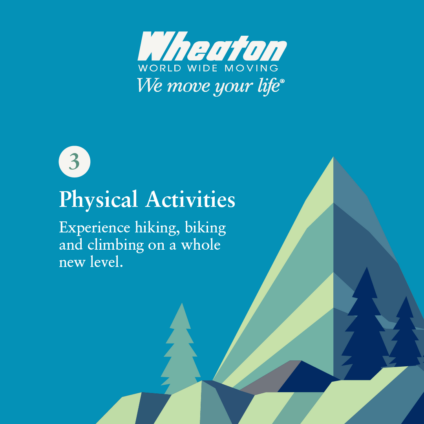
There’s more to the mountains than the views. Because of the natural landscape and ability to experience all four seasons, you’ll be able to engage in a wide range of physical activities, including hiking, mountain biking, skiing, rock climbing, fishing and other alpine sports. Often these opportunities exist only a few steps away from your front door.
Peace and Privacy
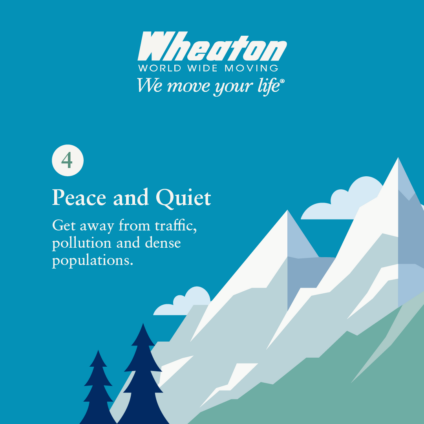
Mountain towns are more isolated and less populated. Your house will be nestled amongst the trees, and your closest neighbors might be the squirrels. Plus, you’ll be far away from the bustle and noise of the city. You’ll enjoy peace and quiet that can’t be found anywhere else. If you’re someone who wants to have their own space, privacy might be the biggest advantage of living in the mountains.
Disadvantages of Living in the Mountains
For many, mountain life is a little slice of heaven. However, it’s important to consider the disadvantages before making a life-changing move.
Higher Altitudes
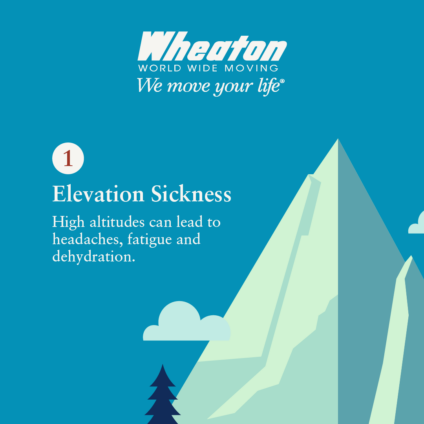
If you’ve lived close to sea level, you might not understand how different a higher altitude might feel. You’ll experience lower atmospheric pressure, which can cause altitude sickness (nausea), headaches and fatigue while transitioning. This condition usually goes away in a few days to a week, but it can make moving uncomfortable.
The longer-term cons of living at a higher elevation include becoming dehydrated more quickly, adjusting cooking times and temperatures to accommodate the lower air pressure and an increased risk of sunburn.
Higher Cost of Living
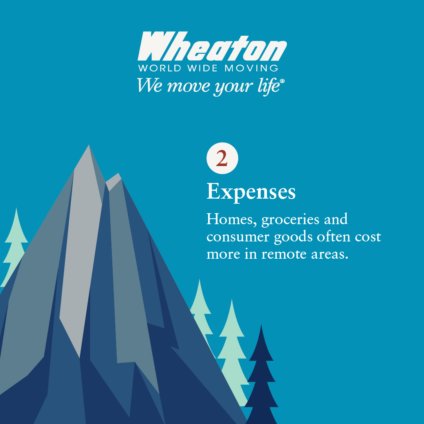
While there are more affordable mountain towns, it doesn’t mean the cost of living will be lower. Groceries, clothing, home goods and anything else you need to buy will either need to be flown into town or driven up winding mountain roads. The extra cost of fuel and labor will be passed on to the consumer, leaving less wiggle room in your budget.
Maintenance Costs
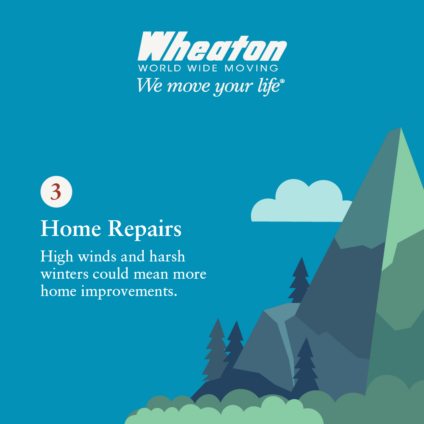
Homes in mountain areas often require special considerations for insulation, heating and snow removal. Your property may need regular maintenance to prevent weather-related damage, such as reinforcing roofs to withstand heavy snowfall, installing proper drainage systems to avoid water damage and maintaining driveways with gravel or heated systems to prevent icing.
Limited Healthcare and Services
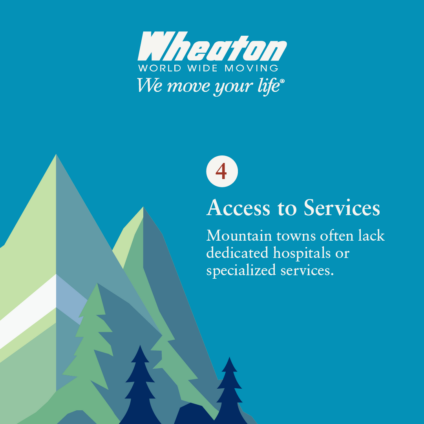
Access to hospitals, shopping and entertainment may require a long drive. Many mountain towns have only small clinics or general practitioners, meaning specialized care isn’t readily available. In emergencies, residents may need to be airlifted or drive significant distances to the nearest major hospital. This can be particularly important for retirees and empty nesters to consider.
Additionally, access to essential services such as pharmacies, dental care and mental health resources may be limited. During winter, heavy snowfall or road closures can further delay medical assistance, making it crucial for residents to be well-prepared.
Which Mountain Town is Right for Me?
If you’re serious about relocating to the mountains, a visit to a few top towns will help you make the final decision. Below are lists of overall best towns and the more affordable options:
Best Mountain Towns to Live In
If you’re looking for the perfect mountain town, here are some of the top destinations that offer stunning scenery, great communities and plenty of outdoor activities:
- Aspen, Colorado: A world-renowned ski town with luxury living and a thriving arts scene.
- Bozeman, Montana: A rapidly growing town with great outdoor recreation and a friendly atmosphere.
- Bend, Oregon: A mix of mountain life and urban amenities, perfect for outdoor lovers and professionals alike.
- Jackson Hole, Wyoming: Home to breathtaking national parks and a vibrant community.
- Lake Tahoe, California/Nevada: Offers year-round adventure with skiing, hiking and stunning lake views.
- Cedar City, Utah: Dubbed the “Gateway to the National Parks,” Cedar City is ideal for winter sports enthusiasts with its significant snowfall and access to national parks.
- Prescott, Arizona: Experience a blend of desert and mountain landscapes with a strong sense of community and outdoor activities.
Most Affordable Mountain Towns
While some mountain towns can be expensive, there are still options that offer affordability without sacrificing the charm of mountain living:
- Leadville, Colorado: A historic mining town with lower housing prices than other Colorado ski towns.
- Ogden, Utah: A hidden gem with great skiing and a lower cost of living.
- Taos, New Mexico: Offers a rich cultural scene and more affordable real estate options.
- Asheville, North Carolina: Nestled in the Blue Ridge Mountains with a vibrant arts community and lower home prices.
- Sandpoint, Idaho: A picturesque town on Lake Pend Oreille with a strong outdoor community and affordable housing.
- Laramie, Wyoming: Offers a cost of living at or below the national average, with access to rock climbing and mountain biking.
- Santa Clara, New Mexico, and Bayard, New Mexico: These towns are among the most affordable, with home values significantly lower than the national average. They offer hiking and horseback riding opportunities in the Gila National Forest.
Your Partner for Moving to the Mountains
If you’re ready to start your new life in the mountains, partner with movers you can trust. Wheaton World Wide Moving has more than 75 years of professional experience helping people move across the United States with:
Get a moving estimate from Wheaton World Wide today to take the first step in your mountain move.



